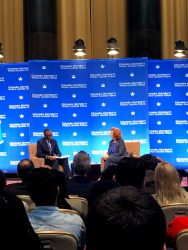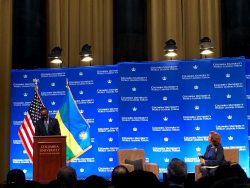On Thursday, September 26th, Rwandan President Paul Kagame attended President Bollinger’s annual World Leaders Forum. This forum offers students the chance to hear preeminent global figures and to be exposed to different viewpoints. Deputy Science Editor Sarah Braner attended.
“Paul Kagame spent his early years in a refugee camp in Uganda,” President Bollinger began. “His parents, members of the Tutsi minority, had fled Rwanda after a deadly uprising, led by the majority Hutu. As a young man, he became a founding member of the army that helped President Museveni to become President of Uganda.” This is the Rwandan Patriotic Front, or RPF, “…a rebel movement that opposed the Hutu leadership of [Rwanda]. In 1994 he took control of [Rwanda’s] capital city and ended the horrific genocide that had claimed the lives of as many as a million Tutsi and moderate Hutus over the course of 100 days. And so the man who had ended days of bloodshed became leader of the country.”
“Today, 25 years later, Rwanda stands in a very different place,” Bollinger noted, transitioning to the current state of the country. He stated that Rwandan authorities have made major strides in public health initiatives like managing the country-wide HIV/AIDS epidemic, the poverty rate is declining, and their economy is growing. “Corruption and crime are at all time lows,” he made sure to report, along with how “more than half of the lawmakers in the country’s parliament are women.” This second part earned a single clap from the audience. (Transparency International, a global NGO and watchdog for corruption, notes that Rwanda is improving. However, they still give Rwanda a score of only 56 out of 100 points, with 0 being the most corrupt and 100 being the cleanest.)
Addressing the elephant in the room, Bollinger went on to say “President Kagame’s critics argue that these achievements have come at a cost. They point to the president’s firm grip on power, the constitutional amendment that extended his term limits, and concerns about freedom of expression and toleration of political dissent.” Kagame has been accused of orchestrating assassinations of his political enemies, and dissidents can be threatened by the Rwandan government even while living outside of the country. “We have an opportunity today at this forum to hear President Kagame,” Bollinger said.
He ended with “one personal observation.” “Modern history is sadly filled with episodes of human conflict, sometimes reaching levels of unimaginable barbarity. If you want [to experience] how a society attempts to come back from these depths of hell, Rwanda is [one of the places] you want to go. It is a remarkable social achievement.”
With that, Bollinger ceded the podium to President Kagame, who began by reflecting on the last time he spoke at Columbia in 2015, when the predominant topic at the time was development: how to sustain it and speed it up. He mentioned that his 3 main ingredients for success in this field have not changed, being smart policy, finding the right people to put those policies into effect, and good politics, meaning “unity, bringing people together, making decisions… for consensus. That 3 point formula continues to work for us.”
He went on to note that Rwanda’s economy continues to grow and that the service industry around sectors like conferences and tourism, in particular, has taken off, inviting the audience to visit the country.
He briefly alluded to the success of the African Union, an organization which boasts 55 member nations and over one billion people, of which he was the chairperson for the year 2018. He mentioned that successes can be attributed to “citizens themselves being part of the process”, and that “the global trend against regional integration clearly has not taken hold in Africa.”
He then said that most African leaders, including himself, are constantly subjected to external governments and forces telling them what is wrong with their countries. “Africans are constantly subjected to this kind of gaslighting… you begin to doubt your own perception, which is of course the whole point…” He then turned to some of the criticism that has been lobbied against him. “In many cases,” he began, before pausing for a minute. He shifted uncomfortably, then moved to the chairs and continued his speech from a seated position, “the criticism is not based on facts or lived experience. It comes from prejudice.” He ended this part by saying “The idea that Africa is a prize to win or lose… that kind of thinking has no place in today’s world.”

President Kagame resumed his speech from a seated position after unspecified discomfort at the podium.
He then quickly mentioned how Rwanda typically scores low on the happiness index despite being the “UN’s most improved country”, saying that the way the questions are phrased invite pessimism and unhappy responses.
He neared the end of his speech by touching on some brief notes of optimism, like the country’s work with The President’s Emergency Plan For Aids Relief (PEPFAR) to measure HIV control (noting in particular that 76% of HIV+ people – including about 80% of HIV+ women – have achieved viral suppression) and efforts to build climate information services for Rwandan farmers. He ended by encouraging students seeking to learn abroad to consider Rwanda for programs and opportunities.
The event then transitioned to a brief question and answer session. One student asked about the state of managing and integrating Congolese refugees in Rwanda and how global refugee numbers are at an all-time high. Kagame noted that Rwanda is a small and dense country, indicating that they cannot take huge amounts of people. However, he said that refugees – many of them coming from the Democratic Republic of the Congo, who do come to Rwanda are given a choice: if they want to go back to their home countries at some point, the UN takes care of them, but if they want to become a Rwandan citizen, that’s allowed. Kagame did mention some security concerns but opted to emphasize Rwanda as a leader in receiving refugees from across the world and treating them well, referencing the recent efforts they have been undertaking in receiving refugees from Libya. Referencing the problem of refugees in general, he expressed that “I don’t think we can expect the UN to do much more than the nation-states themselves”, noting that the UN consists of these states and apparently indicating that it can only be the sum of its parts.
Two students asked similar questions, one inquiring about how long Kagame plans to remain as president (he was granted the right to remain as president until 2034 in 2015) and another asked more bluntly about his retirement plans. He answered that originally, he was not chosen to be president, referencing (though not naming) his presidential predecessor Pasteur Bizimungu, who assumed power after the 1994 victory in Kigali and had Kagame as his vice president. (Bizimungu resigned in 2000, handing the reins to Kagame, who many believed had really held most of the power anyway.) He said that originally he didn’t feel ready for the position, but that others had convinced him to take it, and that he has not been president this long by choice. “Maybe I should not be asked this question,” he said.
Images via Bwog Staff


 1 Comments
1 Comments

1 Comment
@Anonymous Sounds like he might be kind of like Yugoslavia’s Tito?